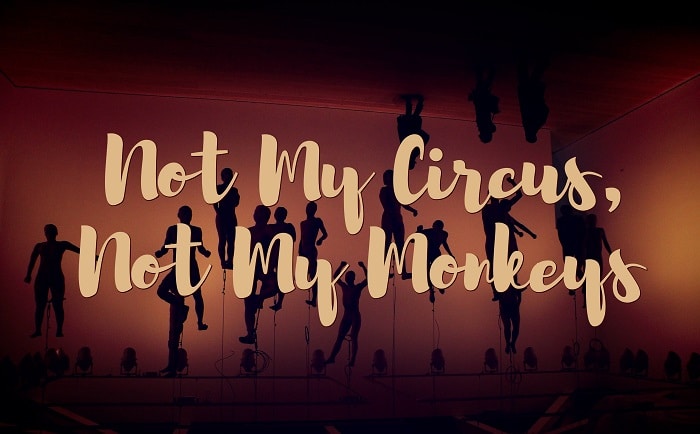“Nie mój cyrk, nie moje małpy” is a polish proverb that roughly translates to “not my circus not my monkeys” in English. It refers to staying away from problems that are not our own and do not affect us. It promotes a behavior and attitude that is healthy for our state of mind and social life. By understanding that others’ problems are their own, we will find ourselves more focused on our own lives. We can also not intrude on others’ lives, which will eliminate stress and conflict.
In this article, we’ll go through the damaging effects overstepping bounds might have on all parties involved and who those parties might be.

A Deeper Look into the Not My Circus Not My Monkeys Saying
This expression addresses those who are prone to putting others first and/or going above and beyond to solve problems they did not cause, nor they are affected by. A series of personality disorders are prone to fall into this trap – but we’ll get to them in a minute. For now, let’s analyze the expression and draw as much knowledge as we can from it.
Defining the Circus
It’s so easy to get caught up in other people’s problems and lives and lose touch with our own world. Often times we offer our time, mental & physical energy, and/or money to help relatives, friends, or coworkers. Because other people’s circuses look so inviting, exciting, and new to us.
But even when we feel we are doing someone a favor we might in fact do the exact opposite. Because we actually prevent them from facing the consequences of their actions. Moreover, we might even overstep some bounds which will only have negative consequences on our lives and interpersonal relationships. The general rule is: if we are not part of the problem, we shouldn’t push ourselves to become part of the solution.
And ultimately, the saying “Not my circus not my monkeys” is about our mental health, too. Because the amount of stress that comes from going out of our way to solve others’ problems is impossible to assess.

Implementing the Not My Circus Not My Monkeys Proverb
We should understand that first of all, taking care of our mental and physical health is not a selfish act. It’s a self-preservation mechanism with the sole purpose of protecting us. We need to understand what truly impacts the quality of our lives. And we need to stop stressing about things that do not affect us directly. Investing time and energy into problems that are not ours is not healthy, and nor is allowing those around us to drag us into their problems.
We shouldn’t set ourselves on fire to make others feel warm.
And even though we might say and think that only the best, selfless intentions are behind this, it might not be always true. There’s this idea that says that, in fact, there is no selfless good deed. That we go out of our way to please others just to feel good about ourselves. To feel useful, appreciated, liked, accepted, or at least tolerated. And this cannot possibly be healthy.
It can be painful, of course, to see those around us struggle with a problem we could solve by just snapping our fingers. This is particularly harder if the one in question is a dear family member or friend. But this is how we build character, this is how a fully functional person develops themselves, and how we help them. By not offering our assistance as soon as a minor issue appears, we allow them to gain a set of skills and competencies that will weigh incomparably more on the long run.
Give a man a fish and you feed him for a day; Teach a man to fish and you feed him for a lifetime.
Who Might Benefit from the Not My Circus Not My Monkeys Saying?

The truth is, we all would benefit from this saying from time to time. However, there are a few personality disorders that are prone to going out of their way to help others.
Avoidant Personality Disorder
Those with avoidant personality disorder tend to be sensitive to rejection and criticism, being seen as shy. They often feel inadequate or inferior to their peers, thus avoid interpersonal contact as much as possible. This is especially valid in a work environment where they might feel threatened by their coworkers’ aptitudes. They slowly but surely become isolated and inhibit themselves avoiding social activities. Their worst fears are disapproval, ridicule, or embarrassment.
Given that one with avoidant personality disorder struggles socially, they might find themselves making great unnecessary efforts to keep the few people in their lives. They can go out of their way to help and make others happy because of a subconscious fear they might end up alone or unwanted.
Obsessive-Compulsive Personality Disorder
Maybe the most misunderstood personality disorder out there, the obsessive-compulsive one is more than just a desire for neatness. A harmful amount of perfectionism, followed by distress when they cannot reach their own standards is what characterizes those with obsessive-compulsive personality disorder. They also feel a desire to control people and situations, without being able to actually do so. Those with obsessive-compulsive personality disorder neglect personal lives in favor of their professional ones and usually have unnecessary strict budgets. They are seen as rigid and stubborn, being inflexible about ethic or moral values.
It goes without saying that those with obsessive-compulsive personality disorder might benefit from the Not my circus not my monkeys saying.

Please note: The obsessive-compulsive personality disorder should not be confused with the obsessive-compulsive disorder, in short OCD. The latter is a specific type of anxiety disorder.
Borderline Personality Disorder
Those who suffer from borderline personality disorder have a frail self-image. They greatly suffer from interpersonal stress, and have an ongoing feeling of emptiness. This can lead to a stress-induced paranoia, an irrational fear of loneliness or abandonment, together with an overall risky behavior. In a try to eliminate these harmful feelings and behaviors, those with borderline personality disorder might find themselves investing resources in helping others instead of their own person.
Who Encourages the Opposite Behavior?
Although not universally applicable, there are a few disorders that support the unhealthy behavior this saying is trying to reduce in those around them.
Narcissistic Personality Disorder
Living with this personality disorder is difficult, but so is being around someone with this disorder.
Those with narcissistic personality disorder believe they are more important than those around them. They have unreasonable expectations of constant praise, attention, and favors. Narcissists also have difficulties in recognizing others’ needs and feelings, often feel envy towards those who succeed. They are likely to take advantage from those who offer help. Thus, they enable a behavior that puts themselves first in the lives of those around them, especially when an emotional connection is present.

Dependent Personality Disorder
Those with dependent personality disorder are seen as clingy, dependent of some of the people around them – be them parents, spouses, friends, or coworkers. They feel the need to be taken care of. They lack self-confidence and requiring excessive reassurance and guidance in the smallest decisions.
Codependent Relationships
Those in codependent relationships might heed this advice. These relationships are harmful to both parties. They affect both the enabler (the one who goes above and beyond to solve problems that are not his or hers, nor did they cause them) and the dependent one. The enabler will try to help someone getting over an addiction, health issue, or another obstacle. But he or she will, in fact, reduce the other’s ability to function by themselves. This ultimately encourages the harmful behavior.
Antisocial Personality Disorder
This disorder manifests itself through a disregard for the feelings, needs, desires, or safety of others. A lack of remorse and an irresponsible, impulsive, sometimes aggressive behavior is not uncommon. Thus, one with antisocial personality disorder will easily manipulate those who have an emotional attachment to them. They will feel they have to choice but to sacrifice time, energy, and other resources into helping them.
But the thing is, you don’t need to have a personality disorder or be around someone who has to benefit from following the Not my circus not my monkeys saying. Because we all fall into these traps from time to time.
